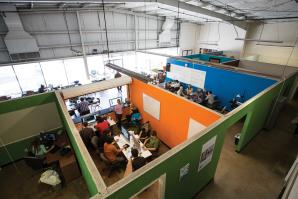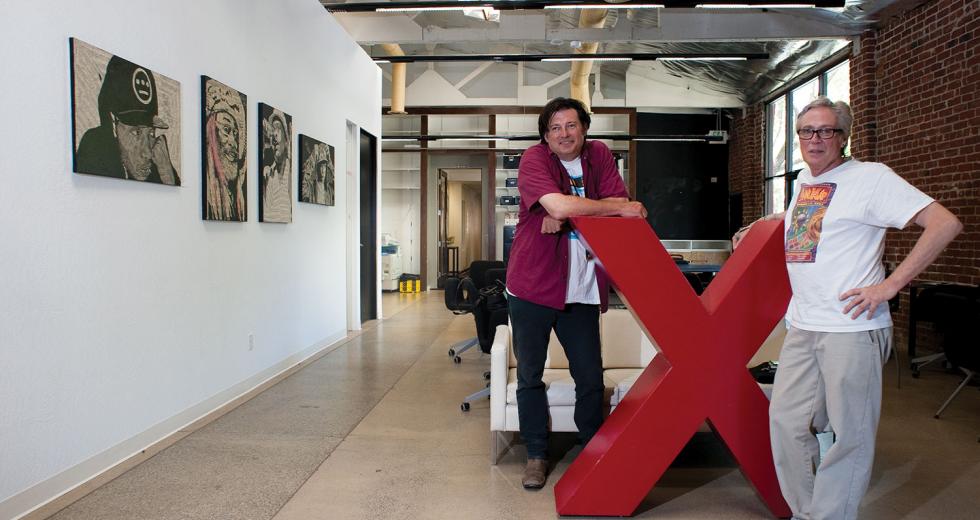The enterprising minds behind the Sacramento Arts and Business Council and The Urban Hive believe growing artistic businesses in the Capital Region is key to economic success. So, to plant and nurture such endeavors, the organizations last month launched Flywheel Creative Economy Incubator.
“Our economy is changing from an industrial to a creative-based economy,” says Brandon Weber, owner of The Urban Hive, a collaborative space that houses and networks innovative startups in midtown Sacramento. “The way we can stay ahead of the game is to be an idea-based, creative, innovative economy.”
At Flywheel, 10 artistic organizations have been chosen to participate in a shared work environment at the Urban Hive that includes support from volunteer business mentors and consultants in addition to assistance with marketing, administration, finances, business development, legalese and business strategies.
The applicants selected were those with the greatest potential for economic impact, community benefit and initiating social change.
“Our goal is to subsidize the business foundation that these types of groups need so they can become employers and contribute back to the community,” says Michelle Alexander, executive director of the Sacramento Arts and Business Council. “We want to change the business climate, and by supporting creative companies we will bring more creativity into the community as well.”
Alexander says creative people produce intellectual property — work that can’t be easily outsourced — and that nurturing an innovative business environment would draw more novel companies and create more jobs while branding Sacramento as a vibrant, creative city with culture and character.
“Creative people flock to certain markets. They’re typically highly educated; many make upward of $100,000 a year,” she says. “They consume art, they produce art and that whole sector contributes heavily into the economy in a unique way.”
In fact, the arts — which include not only fine and performing arts, but fashion, design, publishing and other creative endeavors — account for more than 9,000 local jobs, according to the Sacramento Metropolitan Arts Commission. More than 3,000 art-related businesses operate in the region.
As part of Flywheel, 40 volunteers from various business backgrounds, including accountants, attorneys, marketers and grant writers are ready to help the fledgling organizations flourish. Chosen from media, photography, filmmaking, design and performing and visual arts, the startups have a year under the wing of the Flywheel program to plant or grow their business.
Kari Shipman, the young owner of Sacramento-based Juniper James, offers public relations and marketing services for independent fashion designers and boutiques within the region. Her company’s goal is to increase consumer awareness about locally made goods and boost the economy by supporting independent retailers.
A former special education teacher, she’s spent the past three years growing her company without a lick of business experience. With the help of Flywheel, she hopes to get her books in line, grow and hire employees.
“I know absolutely nothing about business finance, so I have done things the best that I can for three years, but it would be great to have business finance 101 and sit down with a CPA,” she says. “And, legal paperwork: When I’m writing up contracts … I need the correct documentation and coverage, and I don’t know how to do all of that so I’ve been calling in favors.”
Likewise, Jerry Perry has been at the helm of Chalk It Up, a Sacramento nonprofit dedicated to funding children’s art education throughout the region, for the past four years. The 22-year-old organization raises money through an annual festival but has faltered as a result of frequent volunteer turnover and a lack of fundraising expertise. Perry sees involvement in Flywheel as the key to turnaround.
“I feel like we’re just now getting established. It’s been a very transitory group; the organization had gotten off track behind the scenes. But now we’re back in order,” he says. “We would love to create the means to bring sponsors in more effectively. It comes down to sales. Right now, we’re out there raising $20,000, and as popular as we are and as beloved as the event is … I think we should be raising $100,000 and putting it back into the arts community, helping with grants and scholarships.”
In addition to increasing the organization’s fundraising capacity, Perry also hopes the experts at Flywheel can help him develop new partnerships, events and beneficiaries.
Although the main goal of this program is to grow creative businesses and the economy, Alexander also hopes the development of these companies and organizations will result in greater connectivity between the arts and the public.
“One of the most often-sought traits in a new employee is creativity and innovation, and much of that comes through exposure to the arts,” Alexander says. Yet research by the Kennedy Center reveals that fewer than 30 percent of schools in the Capital Region offer arts education.
“By having a strong creative sector, you tend to have a workforce that is better able to be competitive and responsive,” Alexander says. “There is nothing worse than sending a problem to a group of people with no creativity.”
Recommended For You

Tech Magnet
Are building owners ready to view leases through a new lens?
When Hacker Lab outgrew 800 square feet on Franklin Boulevard last year, the founders needed more than additional space. They needed a change of scenery.

Social Network
How crowdfunding connects strangers — and your business – to money
“Small Market, Big Heart” tells the story of the Sacramento Kings and their fans’ fight to hold onto the team. But the 80-minute documentary — packed with NBA archive footage and interviews with Kings’ executives, local politicians and sports entertainment personalities — isn’t from the NBA offices or an established production company.



